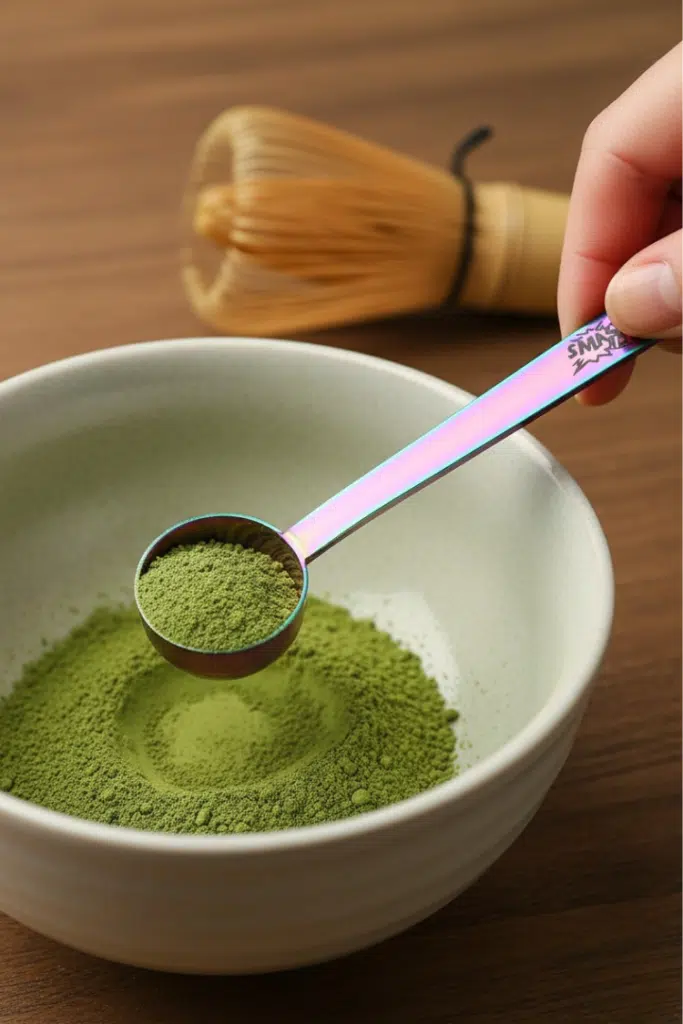Matcha = Superpowered Good Energy
While matcha might be new to your morning ritual, it’s been a part of tea culture for over 1,000 years. Matcha is finely milled green tea powder made from shade-grown leaves—bright green, rich in antioxidants like catechins (including epigallocatechin gallate, or EGCG), polyphenols, chlorophyll, and quercetin, and buzzing with benefits such as improved cognitive function and cardio-metabolic health.
Packed with a high concentration of L-theanine—which regulates caffeine uptake—our matcha delivers a smooth buzz that won’t leave you jittery. The proof?
Studies show that matcha enhances attention and work performance under psychological stress better than caffeine alone, as demonstrated in a 2021 research published in Nutrients. Add in a serious dose of antioxidants—matcha contains up to 137 times more EGCG than brewed green tea according to some analyses—and you’ve got a drink that supports focus, immunity, and overall good energy.
Research from the National Institutes of Health highlights its anti-inflammatory properties, while a 2024 Harvard study links daily matcha intake to better brain health, heart function, gut microbiome changes, and reduced stress.
Additionally, catechins in matcha may aid mild weight loss by boosting metabolism by up to 17% during exercise, per the American Journal of Clinical Nutrition, and a 12-month study in 2024 found that 2g of matcha daily improves sleep quality and social cognition in adults over 60.
At Smash JTea, we take matcha seriously. Created by YouTube star and video game expert Smash JT, our organic ceremonial-grade matcha is stone-ground from the youngest leaves, with stems and veins removed for purity. It provides caffeine per teaspoon serving, along with L-theanine for sustained energy. No shortcuts—just vibrant, ceremonial-grade matcha, prepared with love, care, and intention to fuel your daily grind.

We’re not anti-coffee—we’re just pro-matcha. While a typical matcha serving has around 70mg of caffeine (compared to 95-120mg in a cup of coffee), it feels completely different. Thanks to L-theanine, matcha delivers a steady, focused buzz without the spike and crash—no jitters, no 3 p.m. slump, just clean energy that keeps you feeling good. A 2021 study in Nutrients found that matcha with caffeine outperforms plain caffeine in maintaining attention during stress. Matcha’s caffeine content can vary (38-89mg per cup), but its synergy with L-theanine promotes alpha brain waves for calm alertness, unlike coffee’s quicker but shorter jolt.
Q: Is matcha healthier than gamer supplements or pre-workout for gamers?
A: Yes—matcha delivers 38–70 mg caffeine + 20–50 mg L-theanine for 4–6 hours of jitter-free focus (Nutrients, 2021), while gamer supplements and pre-workouts spike 100–400 mg caffeine with artificial sweeteners and taurine linked to GI issues and cardiovascular strain (J. Int. Soc. Sports Nutr., 2025). Matcha also packs 137× more EGCG antioxidants than steeped green tea (J. Agric. Food Chem., 2003), supports brain health (Harvard, 2024), and avoids crashes—perfect for long gaming sessions.
Technically, matcha is a form of green tea. But during the growth cycle, a shade is put over the tea plants, which creates an intense environment for the plant. In a fight for survival, the plant’s nutrients are concentrated into the leaves, giving it a bright green color and amplified health benefits.
Those leaves are then hand-picked, steamed, and dried before being milled into a fine powder. Unlike green tea, which is steeped in water and discarded, matcha is whisked into water, so you consume the entire leaf and all its nutrients—equivalent to the vitamins, minerals, and antioxidants in 10 cups of brewed green tea, plus added dietary fiber. Nutritionally, matcha packs more: around 4 calories per serving versus green tea’s near-zero, 38-89mg caffeine compared to green tea’s 20-50mg, and significantly higher EGCG levels (up to 100 times more in some comparisons), leading to stronger anti-inflammatory and brain-boosting effects.

Proper storage keeps matcha fresh, preserving its bright green color, umami flavor, and nutrients like EGCG. Unopened tins last up to a year; once opened, consume within 1–2 months for peak quality.
Store in a cool, dark, dry place like the refrigerator to slow oxidation and extend shelf life—avoid heat, humidity, light, and air exposure.
Use an airtight container or the original tin; for fridge storage, let it reach room temperature before opening to prevent condensation.
Keep away from strong odors, as matcha absorbs them. Follow this, and your powder stays vibrant for Smash JT-level energy sessions.
Matcha has surged in popularity, but myths persist—here’s the truth backed by facts.
Myth: All matcha is just ground green tea. Fact: Matcha requires specific shade-growing and stone-grinding for its unique profile; regular ground tea lacks the nutrients and flavor.
Myth: Matcha always tastes bitter. Fact: High-quality ceremonial matcha, like Smash JTea’s is smooth and umami-rich if prepared at 160°F; bitterness signals low grade or overheating.
Myth: Matcha has no caffeine. Fact: It contains 38-89 mg per serving, but L-theanine tempers it for steady energy.
Myth: Greener color means better quality. Fact: Vibrancy indicates freshness, but artificial dyes can fake it—SmashJTea’s natural hue comes from proper processing.
Myth: Organic is always superior. Fact: While SmashJTea is organic, quality depends on cultivation; non-organic can match if pesticide-free. Bust these myths and enjoy SmashJTea’s tins with confidence.